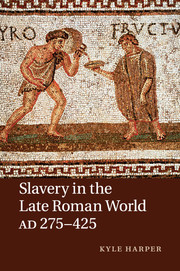Book contents
- Frontmatter
- Contents
- List of tables
- Acknowledgments
- PART I THE ECONOMY OF SLAVERY
- Introduction
- 1 Among slave systems: a profile of late Roman slavery
- 2 The endless river: the supply and trade of slaves
- 3 Oikonomia: households, consumption, and production
- 4 Agricultural slavery: exchange, institutions, estates
- PART II THE MAKING OF HONORABLE SOCIETY
- PART III THE IMPERIAL ORDER
- CONCLUSION
- APPENDIXES
- Bibliography
- Index
3 - Oikonomia: households, consumption, and production
Published online by Cambridge University Press: 05 August 2011
- Frontmatter
- Contents
- List of tables
- Acknowledgments
- PART I THE ECONOMY OF SLAVERY
- Introduction
- 1 Among slave systems: a profile of late Roman slavery
- 2 The endless river: the supply and trade of slaves
- 3 Oikonomia: households, consumption, and production
- 4 Agricultural slavery: exchange, institutions, estates
- PART II THE MAKING OF HONORABLE SOCIETY
- PART III THE IMPERIAL ORDER
- CONCLUSION
- APPENDIXES
- Bibliography
- Index
Summary
THE ECONOMY OF THE ROMAN HOUSEHOLD
Contemplating ascetic withdrawal from the material world, Basil of Caesarea reflected on the burdens of ordinary adulthood: “Once a man is united by marriage, he takes on another welter of cares: if he does not have children, the desire for progeny. If children are born to him, anxiety about their upbringing, the surveillance of his wife, the care of the house, the management of the slaves, suits over contracts, fights with the neighbors, the complications of the law courts, the risks of business, and the tiring work of farming.” For Basil, care of the slaves was a standard element of household life, on the indistinct border between the human and proprietary sides of the family. The letter of Basil is a reminder that Roman slavery was essentially economic, in the root, semantic sense of oikonomia, household management. Basil's ascetic letter described, in an unusually pessimistic tone, the typical worries of that class of “gentlemen landowners,” who had been the target audience of economic discourse for nearly a millennium. But conversations about sound and efficient housecraft resonated widely across the social scale – and Basil's householder, we should note, knew the exhausting work of farm labor.
- Type
- Chapter
- Information
- Slavery in the Late Roman World, AD 275–425 , pp. 100 - 143Publisher: Cambridge University PressPrint publication year: 2011



